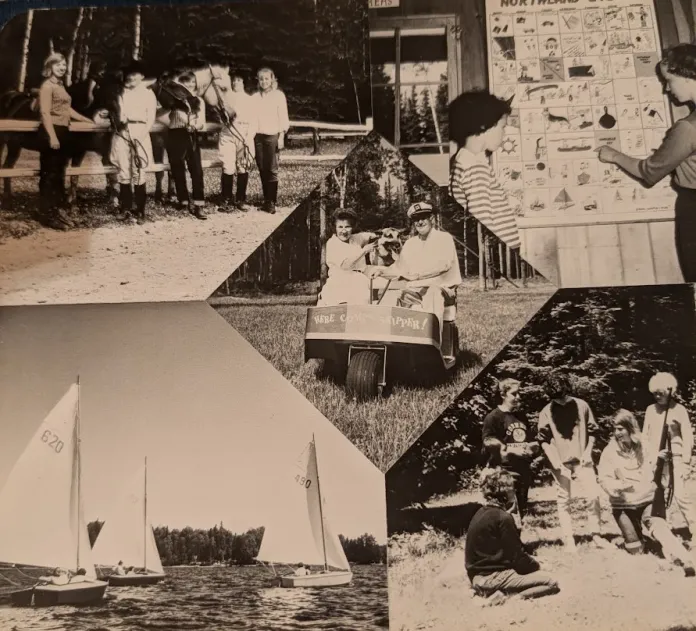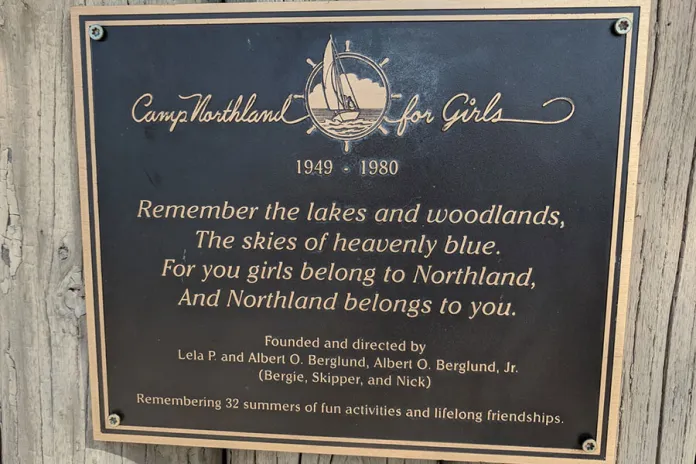From Camp Northland to Camp du Nord
A Legacy Continued
As featured in Letters from Camp Magazine – Fall 2025.

“Without even having to think, I am in the stern of a canoe gliding across Lake Burntside. The water and the impossibly blue sky are separated by a band of intense green, forming a landscape that never gets old,” said Kay Lehman Schlozman. “In the bow of my canoe — and in the canoes that are traveling beside the one in which I am paddling — are friends I have known for more decades than I care to count, since I arrived at Camp Northland at the age of 10.
“I have returned to Lake Burntside many times since that first summer [in 1957], and I conclude each visit by standing on the shore and bidding the lake farewell, preserving the memory until I return in a couple of years. That setting, along with the friends associated with it, is a fundamental part of who I am. I am very grateful for them.”
YMCA Camp du Nord’s fabled history often begins with a tale of sister-teachers and a certain famous Finnish sauna. But one of the most beloved aspects of the camp had a different origin, one rich in stories and celebrated by alumnae like Kay, to this day.
Its name — Camp Northland for Girls — is known to many at du Nord, though the camp itself is something of a mystery to most.
Though if you know where to look, Camp Northland left an indelible footprint on du Nord, just as it did on the women who attended so many summers ago.
The freedom to be
The camp was founded in 1947 by husband and wife Al “Skipper” and Leland “Bergie” Bergland, and operated until it was sold to the YMCA of Greater St. Paul in 1980. Offering seven-week sessions, the camp’s mission focused on fostering a love of the wilderness, developing outdoor skills, promoting self-reliance, and providing fun.
The camp was unlike anything else in its opening years. It wouldn’t be until 17 years later that the Y’s Northwoods camps (YMCA Camps Widjiwagan, Menogyn, or Warren) would begin to offer programs for girls, and du Nord wouldn’t become a Y camp until 1960.
“It didn’t occur to me until after college that we were an anomaly. There were girls camps, and I don’t know how unusual we were, but taking trips, six days in the Boundary Waters, I don’t know if they were doing that with girls,” said Susan Mozena. “What I was given by going there was such a special gift. To have a sense of physicality. That sense of c4onfidence. Camp gave me the confidence to know my physical self as well as my intellectual self.”
Daily activities allowed for consistency and exploration. Every day after breakfast, the girls gathered for Morning Sing. On the big board in the lodge, counselors would hang up the activities for the day, and kids would sign up and head out for fun and adventure, growing in confidence.
“Northland allowed girls to develop independently of the social stereotypes and restraints we endured at home,” said Lindsey Lang. “I arrived at Camp Northland as a shy preteen, and through the supportive environment developed the confidence to sail on a windy day to win the annual sailing regatta, to play the fool in weekly theater performances, but mostly to make friends that are still among my dearest friends 60 years later.”
Camp activities included canoeing, sailing, swim lessons, water ballet, tennis, archery, riflery, drama, horseback riding, and more. The gymnastic activities used a balance beam made out of a straight tree. Music and singing were important to camp — every canoe trip that went out brought back a new song, usually written to the tune of a popular song from the radio.
From a blog entry by Molly Rubens Nunnelly, the lyrics to one favorite:
Tall girls, short girls, fat and thin,
Whatcha gonna do when the heat sets in?
Nothin' to do, nothin' to say,
That's the time to pack your bags and go away:
Come to Camp Northland where the breezes blow,
Come to Camp Northland where you swim and row;
Answer the ever luring call:
Camp Northland girls, the best of all!
Boom dadi yada, Some Girls!
“This was my home away from home,” said Lindsey. “Nine months of school were just waiting for camp.”
The bonds of harmony
Fast forward to September 2024, and the dining hall at Camp du Nord filled with song over the lunch hour. A group of about 20 women sat at the wooden tables, chairs pushed back after eating something delicious. Small groups of staff and campers fell silent as the melody swelled.
When they finished, these women, most of whom were at least 70 years young, smiled and moved on with the afternoon of their semi-annual reunion. The first of these reunions took place in 1986, and they’ve continued ever since. Filled with fellowship and song, they’ve drawn these women together again in the decades since, growing as the years went by.
Lindsay, who attended camp from 1964-71, said that initially, reunions were organized with a mailing list of 600 names. They started having reunions every three years, and e-mail and modern communications have made it easier to stay connected as the years went by.
Pat Schultz, a Northland alumna and the retired 25-year aquatics director of the then-named Northeast Family YMCA in White Bear Lake, walked past some Y staff deep in conversation. “We love to sing, you know,” she said. “A few years ago, we had a reunion in Alaska. We got flown in by a bush plane and canoed down the river. Some of the women started to complain, ‘we never saw any wildlife.’ ” Pat smiled, a gleam in her eye. “I told them it’s because we never shut up! We just never stopped singing all the way down that river.”
“Camp was so empowering to us,” said Kay. “They assumed we were capable of doing things and let us make our own decisions.”
Pat agreed. “The thing about Northland was that no one ever told us we couldn’t do whatever we wanted to do.”
The ways Northland lives on today
Skipper and Bergie’s son, Nick, took over as director in 1968 and ran camp for 12 years. But in 1981, he decided to close camp and sell the property. For two years, the camp sat empty, during which time Northland alumni visited and collected as much memorabilia as they could. Camp signs, song books, the dining hall bell, and much more were gathered up. Pat remembers filling her car with as much as she could, determined to preserve as much of the history of Northland as possible.
Ultimately, the YMCA purchased the property in 1982, and, led by the former Widjiwagan Program Coordinator John Shepard, they established YMCA Camp Northland, offering North Woods experiences to special-needs groups. Northland operated as an independent camp until 1991, when it was officially merged with du Nord, where ever since its been known as Northland Village
But Northland’s legacy isn’t confined just to its former boundaries. By the early 1990s, Skipper still owned 78 acres of property east of du Nord, known as Pine Pointe. He sold that piece of land to the YMCA in 1994, which allowed camp to expand into the three villages it is today.
Today, the connection to Northland isn’t lost, nor forgotten. Du Nord’s thread is inextricably wound through Northland, just as the alumnae from Northland have adopted du Nord as their convening host for their reunions.
“It is so cool that the Northland women are still so connected. It is always fun to hear their camp stories and listen to them singing their songs,” said Emily Weise, camp’s fall, winter, and spring program director.
Every week of the summer, the du Nord team hosts a tour of camp, highlighting its history. As these tour groups explore camp’s three villages — Pine Pointe, du Nord, and Northland — camp staff share what they know about the old girls’ camp as people walk toward the Boat House with its memorial plaque, or look down the lake shore toward Skipper’s Cabin — renamed for Al Bergland not so long ago. Families and staff alike stand upon Sailor’s Rock, gazing out toward Blueberry Island just as Kay has, though few know its old name. Perhaps after reading this article, more will know it by this name.
The next time you find yourself wandering to the Northland Boathouse at du Nord, seek out the plaque affixed to its wall, which reads:
Camp Northland for Girls
1949-1980
Remember the lakes and woodlands,
The skies of heavenly blue.
For you girls belong to Northland,
And Northland belongs to you.
Remembering 32 summers of fun activities and lifelong friendships

“The legacy of Camp Northland remains at camp to this day,” said Andy Sinykin, Camp du Nord’s executive director. “Whether it's during a week of family camp or as part of the tri-annual 'Northland Girls' reunion. The du Nord campers and staff continue to feel the passion for the outdoors and the value of community that was instilled by Camp Northland years ago.”
Forever in the hearts of the women of Northland
Reflecting on her time at Northland, Lindsey imagines herself on Sailor’s Rock, looking out at Blueberry Island onto the North Arm of Burntside, down toward the Narrows. A song comes to mind, set to the tune of “Follow Me” from “Camelot.”
Loving hearts, peaceful minds,
One in thought, hopes entwined,
Smiles mirrored in your eyes,
All these things, friendship ties.
…
All these things that bring peace,
In friendships true never cease, never cease, never cease.
Just like the legacy of Camp Northland for Girls, a legacy that will never cease to be a part of the YMCA tradition.